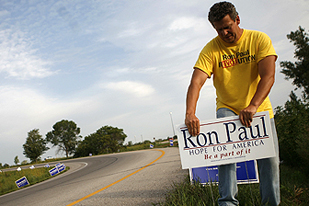Ron Paul’s internet revolution
How the anti-war Republican has harnessed the web for his campaign.

 |
| Paul’s supporters are combining old and new methods to win their candidate the nomination [GALLO/Getty] |
While the internet has proved the medium of choice for the 2008 presidential campaigns, few have profited from its power as effectively as Republican presidential hopeful Ron Paul.
A quick search on YouTube reveals thousands of videos, spam messages and exhortations to join the Paul “revolution”.
Keep reading
list of 4 itemsHong Kong’s first monkey virus case – what do we know about the B virus?
Why will low birthrate in Europe trigger ‘Staggering social change’?
The Max Planck Society must end its unconditional support for Israel
The Texas congressman’s fiery and impassioned rhetoric in the Republican presidential debates has inspired his supporters to take up virtual arms for him; harnessing the unifying power of the web.
“If you write a positive article about Ron Paul online you’ll get a huge spike in [internet] traffic to your site,” Justine Lam, Paul’s “eCampaign” director, told Al Jazeera in an interview.
She could be right. Paul’s YouTube channel boasts more than six million views, he has more MySpace friends than any other candidate and he is one of the most searched for topics on Technorati.
‘Decentralised’ campaign
|
Your Views |
|
What impact will the US presidential race have on your country? |
But the impetus for such a campaign sprung largely from his supporters themselves.
Lam said that while many candidates hire professionals to develop and maintain their campaign websites, her work for the Paul campaign has been much more “hands off”, in part because of resources but also because of the nature of Paul’s supporters.
“We decentralised everything,” she told Al Jazeera, “We really opened up the campaign … partly due to regulations and partly due to a lack of resources.”
Paul’s supporters do much of the online, and offline, campaigning for him of their own volition, in one example, supporters organised a one-day fund raiser which raised up to six million dollars – a record for a Republican presidential candidate this year.
“We don’t tell them what to do,” said Lam. “Instead they’ve experimented and that’s come out in creative ways over the internet. Often we don’t know about those until it gets back to us.”
Libertarian candidate
 |
| Howard Dean was one of the first candidates to harness the power of the internet [EPA] |
A Texan congressman who trained as a doctor and was a flight surgeon for the US Air Force in the 1960s, Paul has an unusual political background.
In 1988 he stood as the presidential candidate for the Libertarian party, a party built on belief of civil liberties, economic liberalism and a foreign policy of non-interventionism.
Paul differs from his fellow Republican presidential rivals on several key issues, most notably on Iraq, which he voted against.
He advocates the closure of all overseas US military bases and for US withdrawal from both Nato and the United Nations, as well as abolishing federal income tax and most US federal government agencies.
His folksy, affable and highly quotable demeanor, so popular amongst US voters, has also made him translate well on the internet.
But he is not the first candidate to look to the web.
Howard Dean used it during the 2004 presidential primaries to define his anti-war status and galvanise his supporters, or “Deaniacs”.
Ironically, what it could also have been the internet that undid his campaign, after an overexcited speech he gave during his campaign was repeatedly posted all over the web.
Inflated popularity?
| In focus |
Dean’s former web strategist, Andrew Rasiej, who now runs TechPresident, a website which tracks the use of the internet in the 2008 race, told the UK Times newspaper that the presidential hopefuls view the internet as a campaign tool in two ways.
Some view the internet as a chance to create a “more robust and participatory democratic system”, while others see the web as “an exercise in top-down control where they create the message, tell us how to vote and where to send the money”, he said.
Although Paul trails in the polls against other candidates such as Rudy Giuliani and Mike Huckabee, he regularly tops online polls, but some web experts have criticised his campaign for artificially inflating his popularity on internet polls and discussion boards.
On top of that, questions remain as to whether his online popularity can translate into votes when the presidential primaries come around.
“We still have some work to do,” agreed Lam.
‘They found us’
Paul himself seems somewhat taken aback by the impact of the internet on his campaign.
“We always knew it was supposed to be important,” he told the New York Times newspaper last month.
“My idea was you had to have someone who was a super expert, who knew how to find people. But they found us.”
Unsurprisingly, Paul has been swift to capitalise on the bounce his web popularity has given him, emphasising on his website that he had consistently voted against regulation of the internet.
But whether this belated embracing of the technology that has propelled him into the spotlight will translate into votes remains to be seen.
